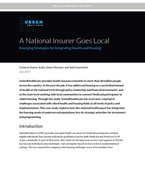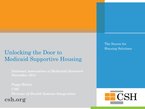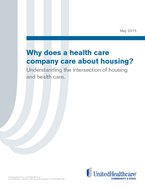Found 51 resources.
0
0
0

Please join us for a time to hear from PHA leaders and industry professionals on key cross-sector topics of interest. This month will focus on strategies for working with your health department including presentations from those in the field and tips from your fellow PHAs already doing the work.
Topics: Health, Housing Is Working Group, Medicaid / Medicare, Partnerships
 Shared by Sandra Ware
on Apr 13, 2023
Shared by Sandra Ware
on Apr 13, 2023 0
0
0
The Housing and Medicaid Services Pilot Program in Indianapolis, also known as the Blue Triangle Housing Program, is a collaboration that includes Anthem, the City of Indianapolis, a non-profit housing organization, and a community mental health center (CMHC).
Topics: Health, Housing, Medicaid / Medicare, Midwest, Partnerships, Supportive housing
 Shared by Housing Is
on Apr 4, 2019
Shared by Housing Is
on Apr 4, 2019 0
0
0
As the population ages, one of the greatest challenges facing state officials is how to organize and pay for long-term services and supports (LTSS) for low-income elderly and disabled adults—the most complex, expensive, and fastest-growing group covered by Medicaid. To help address this challenge, a toolkit for state leaders published in 2017 has been updated.
Topics: Disabilities, Health, Low-income, Medicaid / Medicare, Partnerships, Seniors
 Shared by Housing Is
on Mar 26, 2019
Shared by Housing Is
on Mar 26, 2019 0
0
0
This series of papers provides an overview and framework for reaching out to stakeholders or potential partners from other sectors that may share your interest in collaborating and sharing data to improve community health. Knowing your audience will help your collaboration craft a successful and productive outreach strategy, strengthen your partnerships, and ensure ongoing sustainability by clearly defining and articulating the value of sharing data across sectors.
Topics: Criminal justice, Health, Homelessness, Housing, Medicaid / Medicare, Partnerships
0
0
0
Integrating health care data with data from other sectors helps address the holistic needs of individual patients while informing the development of population-level programs and policies that can improve outcomes, both in health care and other sectors. This paper provides guidance for those in non-health care sectors (e.g. housing, social services, community-based organizations) on effectively engaging and advancing conversations with health care stakeholders about collaborating to share data, focusing on the specific stakeholder of hospitals/health systems.
Topics: Health, Housing, Low-income, Medicaid / Medicare, Partnerships
0
0
0
The State of Arizona’s Medicaid agency (AHCCCS) recognizes the vital importance of safe, decent and affordable housing to health. With a portfolio of over 3,000 units of affordable housing for Medicaid members with a determination of serious mental illness (SMI) and/or substance use disorder, housing is a major component of how the State of Arizona assists those trying to recover and stabilize.
Topics: Health, Housing, Low-income, Medicaid / Medicare, Partnerships, Place-based
0
0
0
Delegates at the 2018 American Medical Association Annual Meeting in Chicago adopted several policies intended to alleviate chronic homelessness and racial housing segregation
Topics: Health, Homelessness, Low-income, Medicaid / Medicare, Partnerships
0
0
0
The State of Arizona’s Medicaid agency (AHCCCS) recognizes the vital importance of safe, decent and affordable housing to health. With a portfolio of over 3,000 units of affordable housing for Medicaid members with a determination of serious mental illness (SMI) and/or substance use disorder, housing is a major component of how the State of Arizona assists those trying to recover and stabilize.
Topics: Cost effectiveness, Health, Housing, Low-income, Medicaid / Medicare, Mental health, Partnerships, Substance abuse
 Shared by Housing Is
on Jan 22, 2019
Shared by Housing Is
on Jan 22, 2019 0
0
0
The nation’s public housing authorities are seeking closer links to health insurers and medical care providers to address social determinants of health.
Topics: CLPHA, Funding, Health, Housing, Low-income, Medicaid / Medicare, Partnerships, Place-based, Research
0
0
0

The Denver Housing Authority (DHA) wins a 2017 Award of Excellence in Client and Resident Services for creating the Health Navigators (HN) program, which provides mental health education, resources, and doctor referrals.
Topics: Disabilities, Health, Housing, Low-income, Medicaid / Medicare, Mental health, Partnerships, Place-based, Seniors
0
0
0
Housing and health systems need to work together. Public housing authorities (PHAs) are significant providers of housing to those in need, offering the health sector scale and expertise. Little was known about how PHAs worked with the health sector writ large. With a national survey, we found that PHAs across the country are engaged in a wide range of partnerships with different health organizations that address various target populations and health priorities. Barriers to housing-health collaboration, such as funding and staffing capacity, can be overcome with cross-system partnerships that...
Topics: Child welfare, Funding, Health, Housing, Low-income, Medicaid / Medicare, Partnerships, Preventative care, Research, Seniors, Smoke-free
 Shared by Housing Is
on Dec 19, 2018
Shared by Housing Is
on Dec 19, 2018 0
0
0
As the Trump Administration continues to encourage states to take Medicaid coverage away from people who don’t meet a work requirement, a new report describes Montana’s promising alternative: a workforce promotion program that targets state resources toward reducing barriers to work.
Topics: Affordable Care Act, Asset building, Health, Legislation & Policy, Low-income, Medicaid / Medicare, Partnerships, Research, Workforce development
 Shared by Housing Is
on Dec 11, 2018
Shared by Housing Is
on Dec 11, 2018 0
0
0

As state and federal officials increasingly search for ways to curb rising health care costs, a decades-old idea is gaining traction: helping people with challenges that have nothing to do with medical care but everything to do with their health.
Topics: Cost effectiveness, Food insecurity, Health, Homelessness, Housing, Low-income, Medicaid / Medicare, Nutrition, Partnerships, Preventative care, Stability, Transportation
0
0
0
CLPHA’s Housing Is Initiative is engaged in a number of cross-sector activities focused on developing partnerships, facilitating a community of practice, resource development, promoting best practices, online collaboration, policy and advocacy, and training and education. Read about recent activities in this Fall Update.
Topics: Child welfare, CLPHA, Community development, Cost effectiveness, Data sharing, Early childhood, Education, Family engagement, Funding, Health, Homelessness, Housing, Low-income, Medicaid / Medicare, Mental health, Partnerships, Place-based, Post-secondary, Research, Stability, Substance abuse, Workforce development, Youth
0
0
0
Half of public housing authorities (PHAs) are engaged in at least one health initiative, almost all in partnership with the health sector, according to a new report by the Council of Large Public Housing Authorities (CLPHA) and the Public and Affordable Housing Research Corporation (PAHRC).Health Starts at Home: A National Snapshot of Public Housing Authorities' Health Partnerships finds that PHAs are key players in addressing the intersection of housing and health and that deepening partnerships between PHAs and health providers can better serve residents' and communities’ health...
Topics: CLPHA, Dual-eligibles, Health, Housing, Low-income, Medicaid / Medicare, Mental health, Nutrition, Partnerships, Place-based, Preventative care, Research, Seniors
 Shared by Housing Is
on Oct 11, 2018
Shared by Housing Is
on Oct 11, 2018 0
0
0
Neighborhoods where insecure housing overlaps with higher rates of emergency department use may be promising areas for interventions under Medicaid value-based payment
Topics: East Coast, Health, Housing, Low-income, Medicaid / Medicare, Partnerships, Stability
0
0
0
Partnerships between medicaid and supportive housing providers
Topics: Cost effectiveness, Funding, Health, Legislation & Policy, Low-income, Medicaid / Medicare, Partnerships, Supportive housing
 Shared by Housing Is
on Aug 9, 2018
Shared by Housing Is
on Aug 9, 2018 0
0
0
UnitedHealthcare provides health insurance benefits to more than 40 million people across the country. In the past decade, it has addressed housing as a social determinant of health at the national level through policy leadership and financial investments, and at the state level working with local communities to connect Medicaid participants to stable housing. Through this work, UnitedHealthcare has overcome a myriad of challenges associated with siloed health and housing fields at all levels of policy and implementation. This case study explores how this national health payer has integrated...
Topics: Affordable Care Act, Data sharing, Funding, Health, Homelessness, Housing, Low-income, Medicaid / Medicare, Partnerships
 Shared by Housing Is
on Aug 9, 2018
Shared by Housing Is
on Aug 9, 2018 0
0
0
Introduction to supportive housing and notes from the field
Topics: Health, Housing, Low-income, Medicaid / Medicare, Mental health, Partnerships, Supportive housing
 Shared by Housing Is
on Aug 9, 2018
Shared by Housing Is
on Aug 9, 2018 0
0
0
In a post health care reform era, Medicaid programs need to build system capacity to effectively manage increasingly complex Medicaid populations while simultaneously seeking innovative solutions to reduce costs and improve access. As states are increasingly becoming more reliant upon managed care for complex populations – such as individuals in need of long-term services and supports, those with intellectual or developmental disabilities, individuals with severe and persistent mental illness, as well as children with special health care needs – the needs of these populations range far beyond...
Topics: Funding, Health, Housing, Low-income, Medicaid / Medicare, Partnerships
 Shared by Housing Is
on Aug 9, 2018
Shared by Housing Is
on Aug 9, 2018 0
0
0
Social determinants of health are the economic and social conditions that affect health outcomes and are the underlying, contributing factors of health inequities. Examples include housing, educational attainment, employment and the environment.
Topics: Affordable Care Act, Disabilities, Health, Homelessness, Housing, Low-income, Medicaid / Medicare, Mental health, Partnerships, Place-based, Substance abuse, Supportive housing
 Shared by Housing Is
on Aug 9, 2018
Shared by Housing Is
on Aug 9, 2018 0
0
0
Health care payment and delivery models that challenge providers to be accountable for outcomes have fueled interest in community-level partnerships that address the behavioral, social, and economic determinants of health.We describe how Hennepin Health—a county-based safety-net accountable care organization in Minnesota—has forged such a partnership to redesign the health care workforce and improve the coordination of the physical, behavioral, social, and economic dimensions of care for an expanded community of Medicaid beneficiaries.
Topics: Affordable Care Act, Cost effectiveness, Health, Low-income, Medicaid / Medicare, Mental health, Metrics, Partnerships, Research
 Shared by Housing Is
on Aug 9, 2018
Shared by Housing Is
on Aug 9, 2018 0
0
0
This report aims to provide the Robert Wood Johnson Foundation (RWJF) and other health foundations with a perspective on the emerging intersection of social determinants of health (SDOH), health care systems, and social and other services. These fields intersect in how and what data are collected, and in ways the data are used to improve health and well-being and promote a Culture of Health.
Topics: Data sharing, Funding, Health, Medicaid / Medicare, Metrics, Nutrition, Partnerships, Place-based, Research
 Shared by Housing Is
on Jul 27, 2018
Shared by Housing Is
on Jul 27, 2018 0
0
0
On January 1, 2014, in states that have chosen to expand Medicaid eligibility under the Affordable Care Act, nearly all chronically homeless people who lacked health insurance became eligible for Medicaid. This Primer offers state Medicaid officials and other interested parties strategies for using Medicaid to meet the needs of this very vulnerable population--some strategies that have succeeded in the past and some that are emerging under provisions of the Affordable Care Act.
Topics: Affordable Care Act, Criminal justice, Disabilities, Dual-eligibles, Funding, Health, Homelessness, Housing, Low-income, Medicaid / Medicare, Mental health, Partnerships, Stability, Substance abuse, Supportive housing
 Shared by Housing Is
on Jul 27, 2018
Shared by Housing Is
on Jul 27, 2018 0
0
0
Both the Centers for Medicare & Medicaid Services (CMS) and New York State (NYS) have embarked on an ambitious journey to improve outcomes for patients and populations, reward the delivery of high value care by providers, and increase long-term financial sustainability. In this document, New York State presents an approach to maximally align CMS’ payment reform efforts for Medicare to the NYS’ Medicaid Payment Reform Roadmap which has recently been approved by CMS.
Topics: Funding, Low-income, Medicaid / Medicare, Partnerships
 Shared by Housing Is
on Jul 23, 2018
Shared by Housing Is
on Jul 23, 2018 









